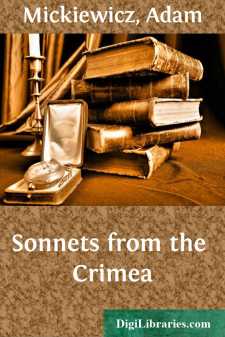Categories
- Antiques & Collectibles 13
- Architecture 36
- Art 48
- Bibles 22
- Biography & Autobiography 813
- Body, Mind & Spirit 142
- Business & Economics 28
- Children's Books 17
- Children's Fiction 14
- Computers 4
- Cooking 94
- Crafts & Hobbies 4
- Drama 346
- Education 46
- Family & Relationships 57
- Fiction 11829
- Games 19
- Gardening 17
- Health & Fitness 34
- History 1377
- House & Home 1
- Humor 147
- Juvenile Fiction 1873
- Juvenile Nonfiction 202
- Language Arts & Disciplines 88
- Law 16
- Literary Collections 686
- Literary Criticism 179
- Mathematics 13
- Medical 41
- Music 40
- Nature 179
- Non-Classifiable 1768
- Performing Arts 7
- Periodicals 1453
- Philosophy 64
- Photography 2
- Poetry 896
- Political Science 203
- Psychology 42
- Reference 154
- Religion 513
- Science 126
- Self-Help 84
- Social Science 81
- Sports & Recreation 34
- Study Aids 3
- Technology & Engineering 59
- Transportation 23
- Travel 463
- True Crime 29
Sonnets from the Crimea
by: Adam Mickiewicz
Description:
Excerpt
ADAM MICKIEWICZ
(1798-1855)
The last of the eighteenth century was an important period for Russia and Poland, not only politically, but in letters and art. It marked the birth of statesmen, patriots, poets and writers. It was into a Poland of great names and greater activities that Adam Mickiewicz was born in 1798, as son of an impoverished family of the old nobility. Three years before, the third and last partition of his native land had taken place, and the signed documents had been hastened to Petersburg to make more triumphant the birthday of the Great Catherine.
Just a few years before this (1792), Kosciusko had courageously led his forty-five thousand valiant Poles in their brave defiance of an overwhelming number of Cossacks and Russians. History had recorded the bloody Turkish wars, the Pugatshev rebellion, the uprising of the Zaporogian Cossacks and the Polish confederations. And with the nineteenth century came the Napoleonic wars with the dramatic entry of Napoleon into Russia, and a new and different mental life began to dawn over Europe.
Mickiewicz was born in Novogrodek in Lithuania. This was the birthplace of Count Henry Rzewuski, who wrote the delightful memories of the Polish eighteenth century, under the title of "The Memories of Pan Severin Soplica," and who declared he considered it an honor to be born a "schlazig" (noble) of Lithuania, and of Novogrodek. He went to a government school in Minsk, and later attended the University of Vilna, which city in his day was a place of Jesuit faith, gloomy convents and echoing bells. All about him epoch-making events for Slav lands were taking place. It was a resounding, inspired age for his race, and he grew up to take a fitting place in that age and to be called "the immortal hero of Polish poetry." Poland just then was the battle-ground not only for the armies of Europe, but for the diplomats. It was a place for statesmen to win their spurs. If accredited to Petersburg or Warsaw, and successful, they were believed to be equal to any diplomatic emergency. Eloquence, inspiration, and patriotic fervor must have cradled his childhood.
The full title of the book is: Memories of Pan Severin Soplica, Cupbearer of Parnau, by Count Henry Rzewuski.
At the time of the birth of Mickiewicz, Russia was bringing to a close a prodigious period of development in almost every field of human activity. It was really the birth-throe of a nation that was to move powerfully, and to dominate—partially—the new age. And the splendid and never again to be equalled pageant of the life of Catherine the Great, with its wild dreams of world dominance and of the glorious revival of perished Greece, had just been unrolled for the amazement of Europe. What dramatic and enchanting memories the names of her followers call up: the Orlows, Potemkin, Panin, Poniatowski, Bestushew-Rjumin, Princess Daschkov, Razumowski.
In France, too, the same preceding period had been brilliant. It had been the France of Voltaire, the Encyclopedists, and a most resplendent and luxurious monarch. England had known her greatest orators and prime ministers. It had been the Prussia of Frederick the Great; the Dresden of August the Strong; the Austria of Joseph the Second.
A little later—during Mickiewicz's own youth—Goethe was at the height of his power and the intellectual dictator of Europe. Under his direction and encouragement the treasures of oriental literature were being translated and made known to the West. This is merely a hasty glimpse of the "mise-en-scene" that preceded the debut in life of the most renowned of Polish poets. The old traditions of absolute and God-created monarchs and princely times were coming to an end, and that democratic modern world, where everything was to change, was close at hand, just over the crest, indeed, of this new century into which Fate was ushering him. He was to see the last of blind power and royal prerogative, and the first dawn of a modern spirit which in time would sweep away forever, the old. It was an uncertain, difficult transition period, without standards and without measurements....


